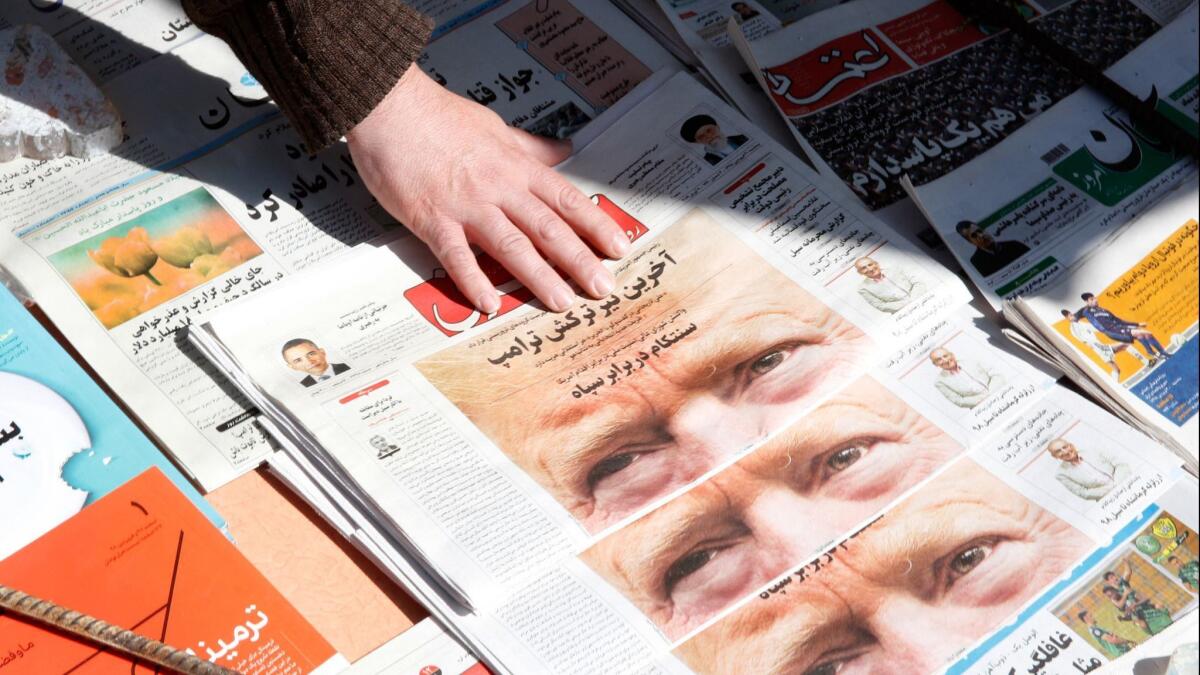Editorial: Will Iran follow Trump’s lead in reneging on the nuclear deal?

- Share via
A year ago, President Trump repudiateda painstakingly negotiated agreement under which Iran has placed significant limits on its nuclear program. The president confidently predicted that Iran’s leaders “are going to want to make a new and lasting deal, one that benefits all of Iran and the Iranian people.”
As he usually does, Trump exaggerated his prowess as a dealmaker. Not only has a new agreement failed to emerge; Iran’s president signaled this week that it might stop complying with some provisions of the one Trump besmirched, the 2015 Joint Comprehensive Plan of Action. Iran and the other signatories to the deal — Britain, France, Germany, Russia and China — continued to comply with it even after the U.S. withdrew. But if Iran reneges now, Trump will bear a lot of the blame.
The accord slapped restrictions on Iran that were designed to prevent it from making atomic bombs. In exchange for Iran’s acquiescence, the United States and other countries lifted the economic sanctions they had imposed to deter Iran from developing nuclear weapons. Trump rashly rejected that trade-off, and his administration has sought to squeeze Iran with sanctions that could prompt Iran to abandon what’s left of the deal.
Enter the Fray: First takes on the news of the minute »
In a nationally televised speech on Wednesday, Iranian President Hassan Rouhani said that Iran would stockpile surplus enriched uranium rather than sending it abroad, an aggressive step that he nevertheless claimed wouldn’t violate the deal. But he also threatened to restart production of bomb-grade uranium unless the European countries that signed the JCPOA guaranteed within 60 days that Iran would continue to “reap our benefits” under the accord — a promise that would be difficult to fulfill if they abided by the new U.S. sanctions.
In withdrawing the U.S. from the JCPOA last year, Trump complained that it failed to address Iran’s development of ballistic missiles and did nothing to constrain Iran’s “destabilizing activities, including its support for terrorism.” He was correct about that, but supporters of the agreement noted that the U.S. could continue to punish Iran for its support for militant groups in the Middle East.
The administration continues to suggest that its goals are a new, more comprehensive agreement with Iran — on Thursday, Trump said that if Iran reached out to him “we can make a fair deal” — but its actions have made that goal more elusive. Moreover, some of its rhetoric sounds as if the ultimate goal is not a new agreement but regime change.
It’s probably futile to argue that Trump should reconsider his rejection of the accord. But his administration should be careful about undermining America’s allies and giving Iran an excuse to tear up the agreement and revive its quest to obtain a nuclear weapon.
Follow the Opinion section on Twitter @latimesopinion and Facebook.
More to Read
A cure for the common opinion
Get thought-provoking perspectives with our weekly newsletter.
You may occasionally receive promotional content from the Los Angeles Times.










